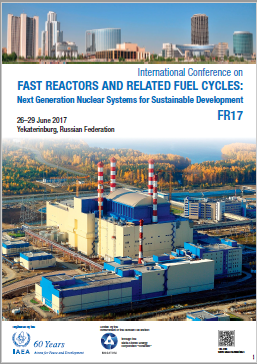Speaker
Mr
Oleg Saraev
(Russian Federation State Atomic Energy Corporation "Rosatom")
Description
The modern open fuel cycle nuclear power has created a number of obstacles for its further development due to enormously low effectiveness of natural uranium use, accumulation of nuclear wastes in thermal reactors, its increasing environmental unacceptability, limited explored natural uranium stockpiles and instability of natural uranium market price originated from the reasons similar to those of fossil fuel market, the most vague and critical reasons being the political ones.
The major part of the above issues are related to the weaknesses of open fuel cycle and can be resolved by the operation of fast reactors which use plutonium from the nuclear wastes as a nuclear fuel, thus making processing nuclear waste economically desirable. Fast reactors turn uranium 238 waste into plutonium with the breeding ratio being more than one due to the excessive number of neutrons and neutron energy as compared to uranium 235.
Plutonium bred in fast reactors may and should be used in thermal reactors during the active operational life. The combined operation of thermal and fast reactors makes a highly efficient and sustainable two-component power plant. In addition, fast reactors “burn” minor actinides which are the major contributors to an overburdened radioactive wastes handling in a long-term perspective.
Two industrial power units with fast reactors are currently operated in Russia, BN600 and BN800 with total electric power of 1500 MW. In addition to power generation, the power units are designed to implement the initial stage of closed nuclear fuel cycle. The implementation stage covers creating the economically favorable environment for thermal reactor waste processing, plutonium breeding for further utilization in both fast and thermal rectors, gaining practical experience in minor actinides disposal. The implementation stage will be accomplished in 2026. The practical outcome of the above program presents an apparent commercial interest to the countries which are currently developing efficient and environmentally friendly nuclear power and is likely to be received in Russia much earlier than in the countries which do not own the industrial fast reactor technologies.
Country/Int. Organization
Russian Federation
State Atomic Energy Corporation "Rosatom"
Author
Mr
Oleg Saraev
(Russian Federation State Atomic Energy Corporation "Rosatom")

